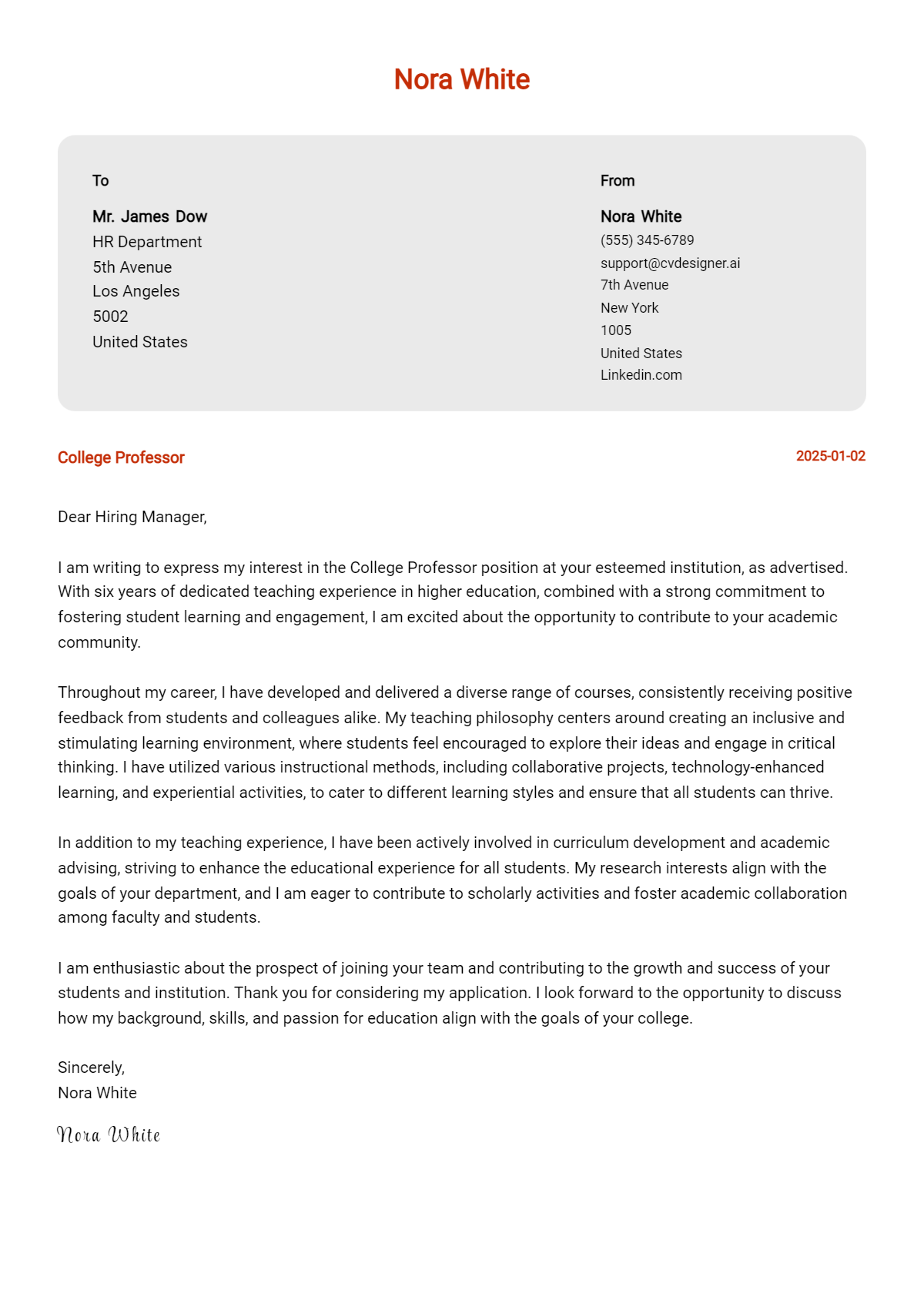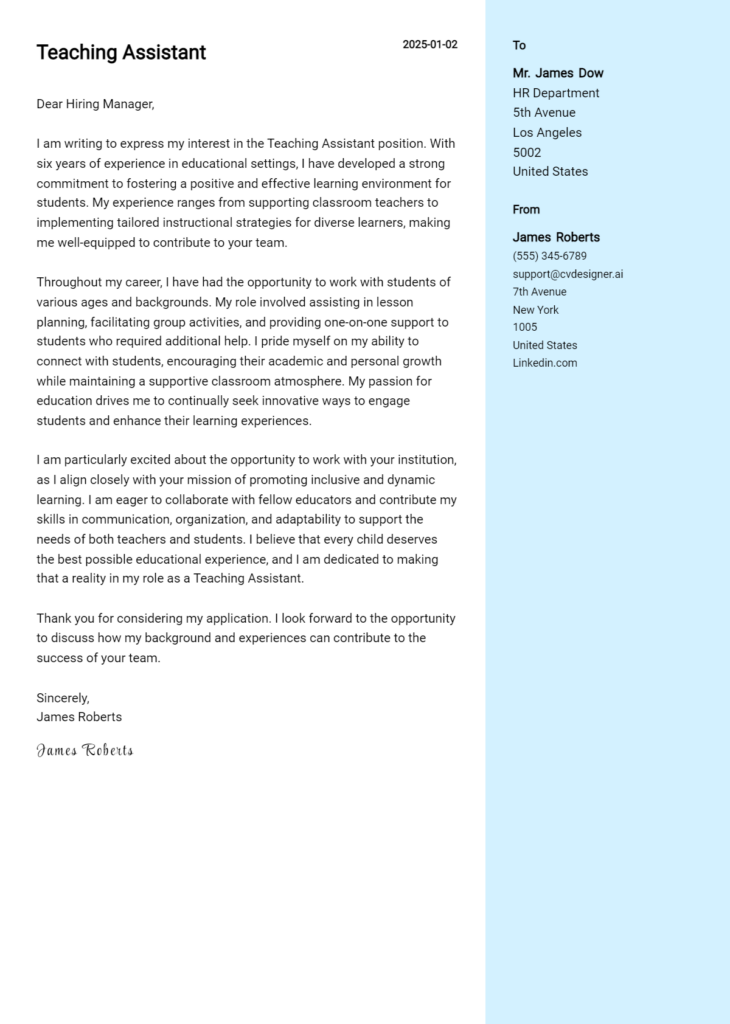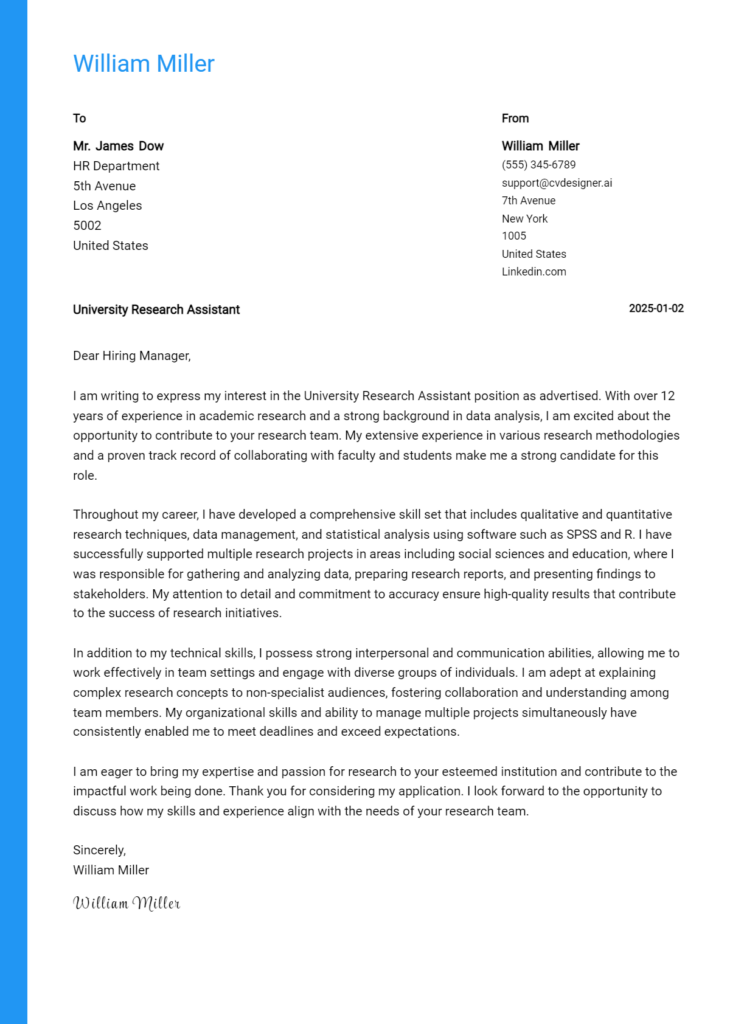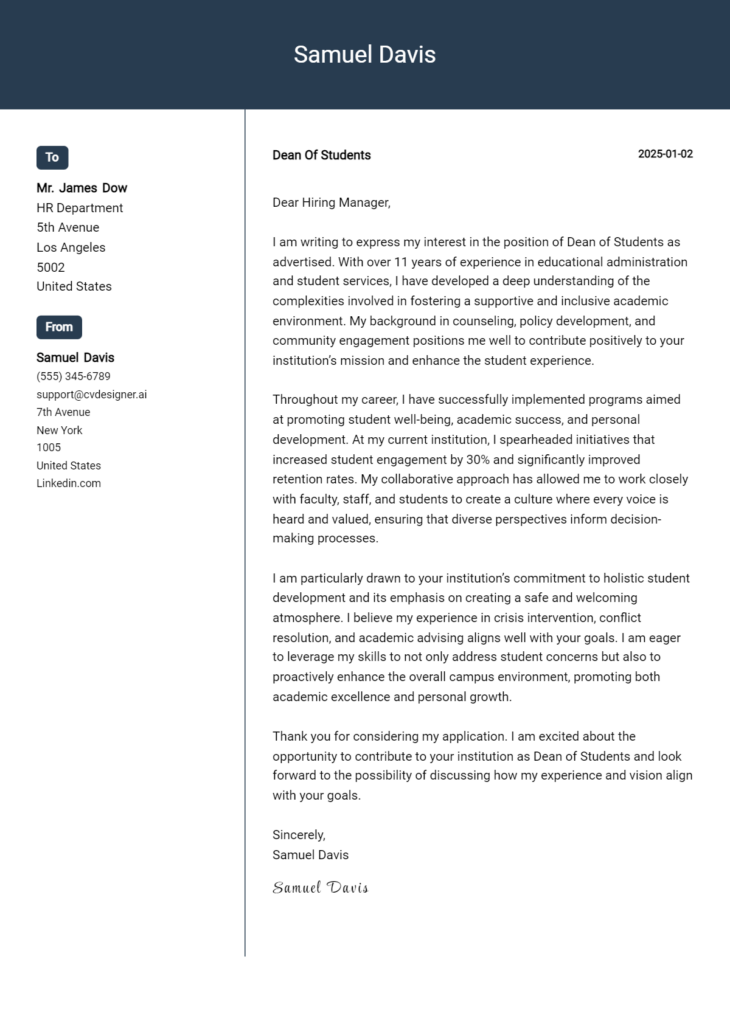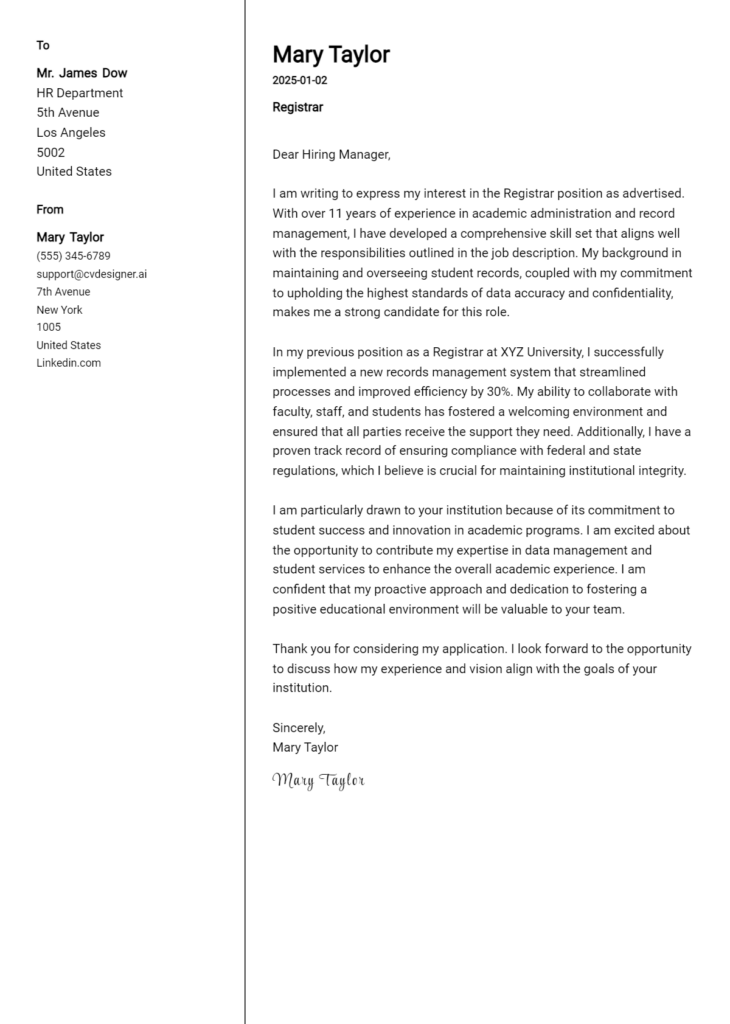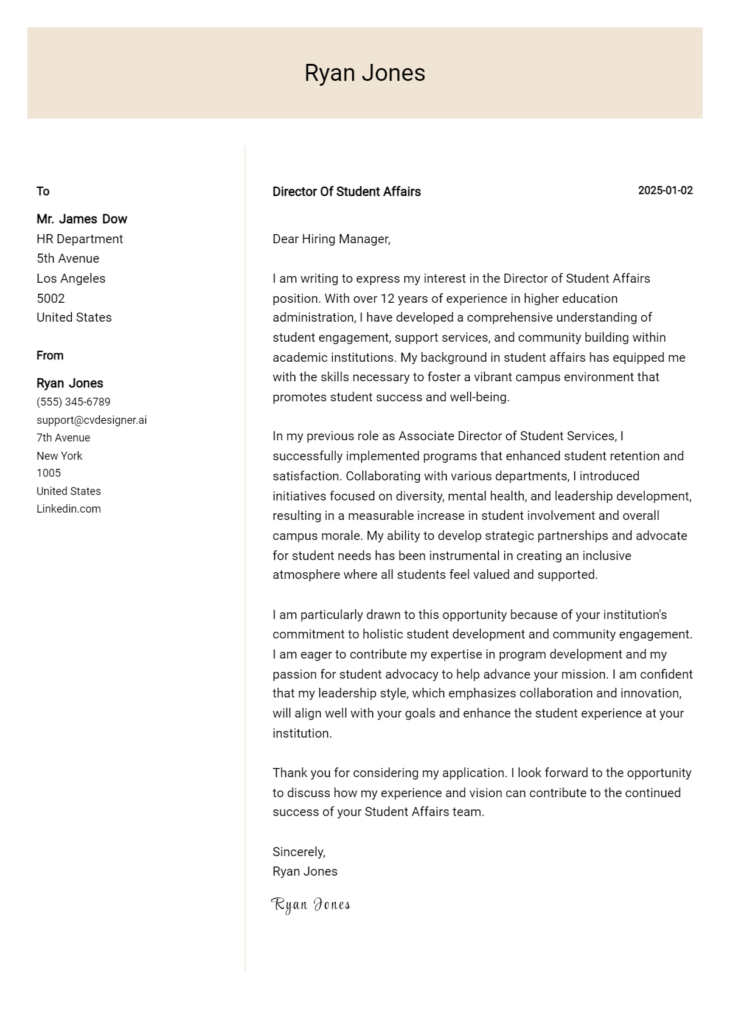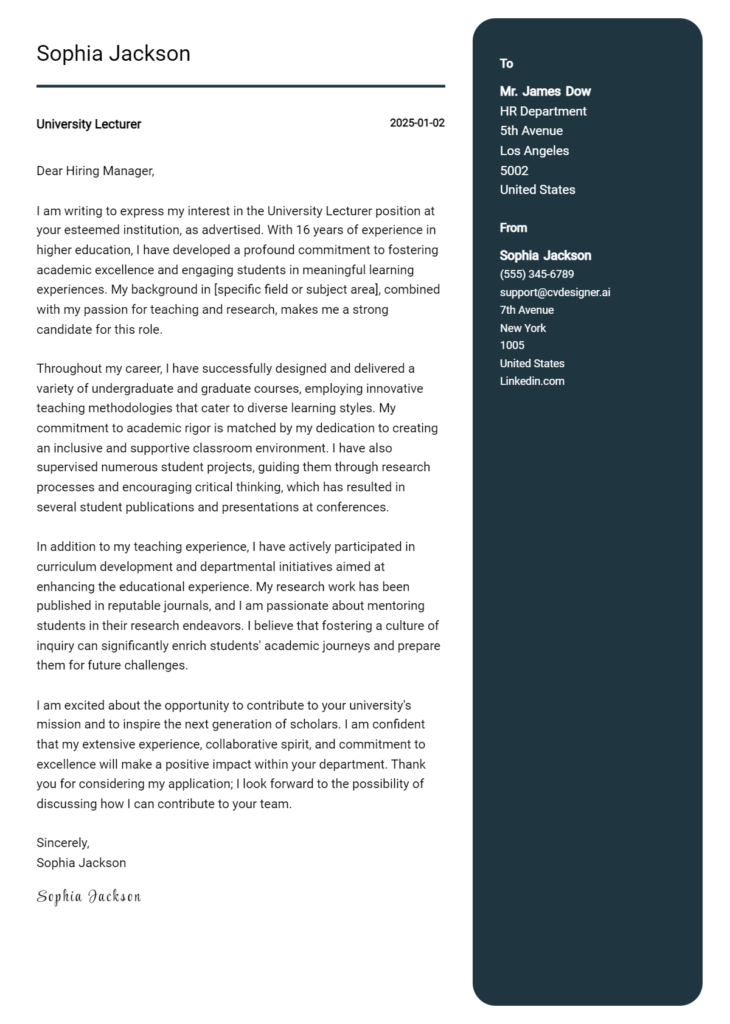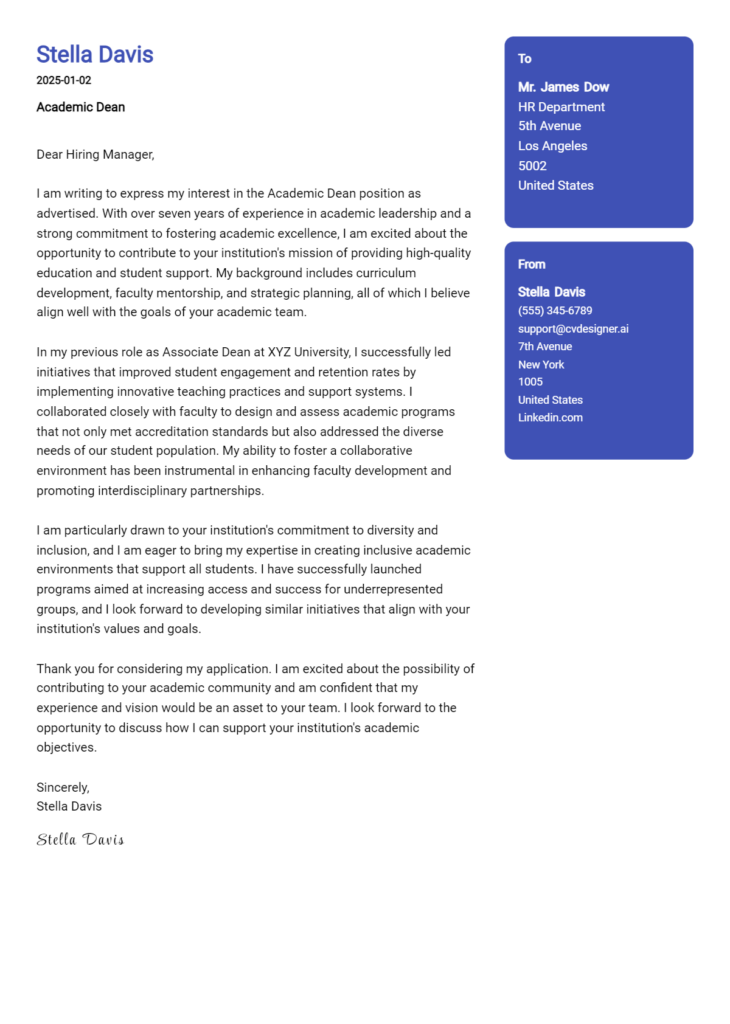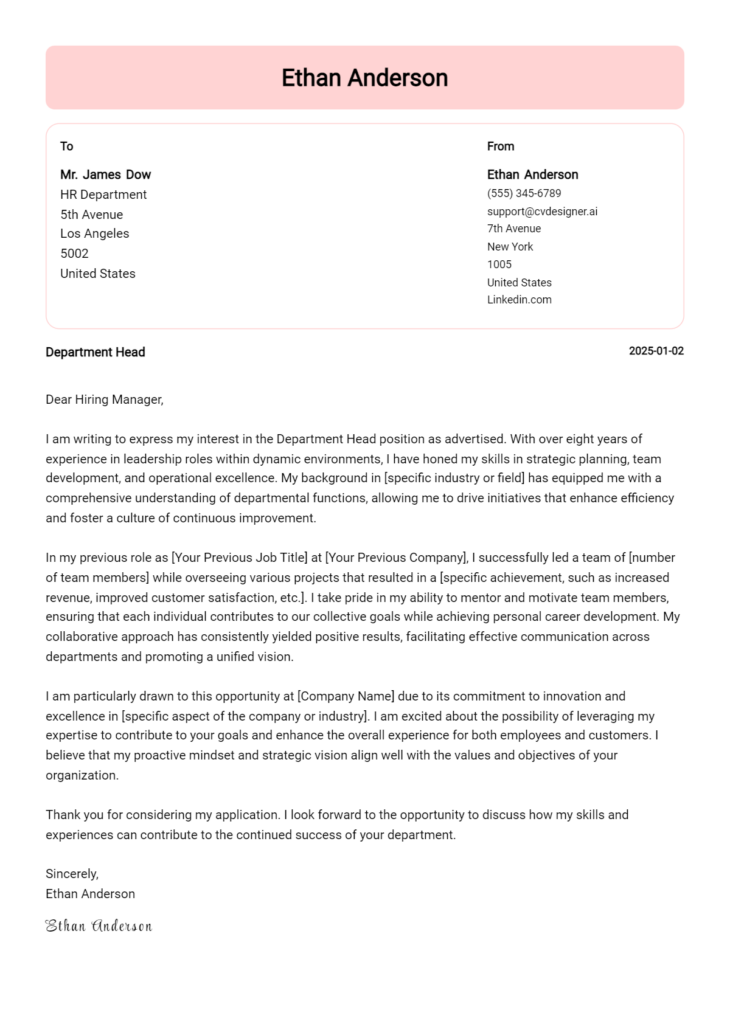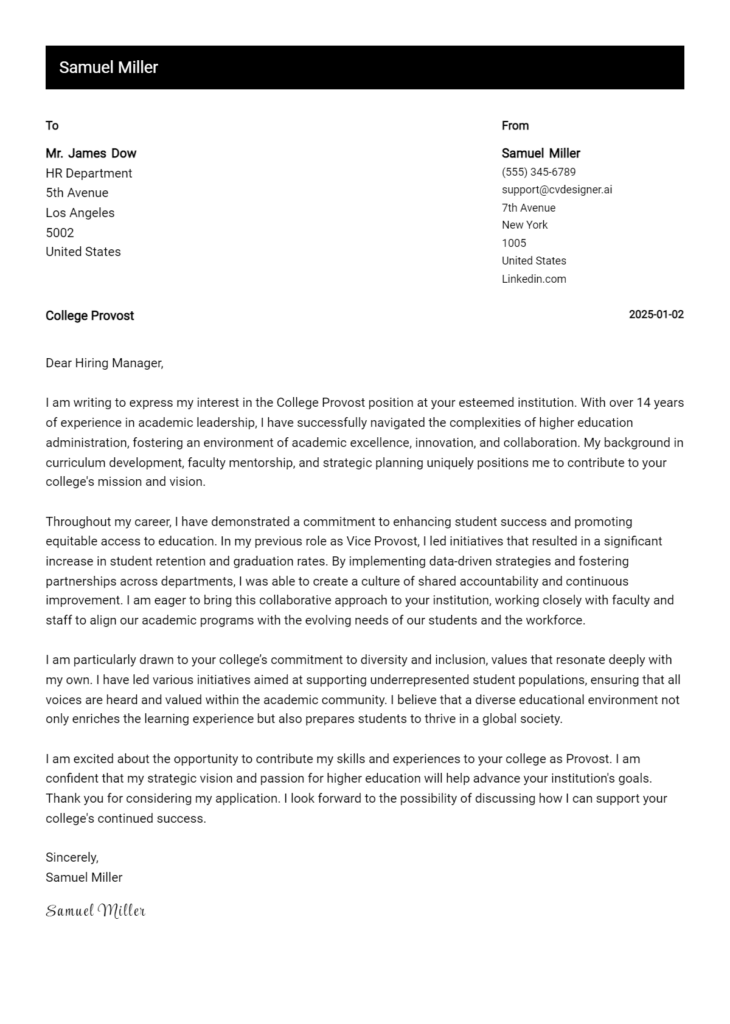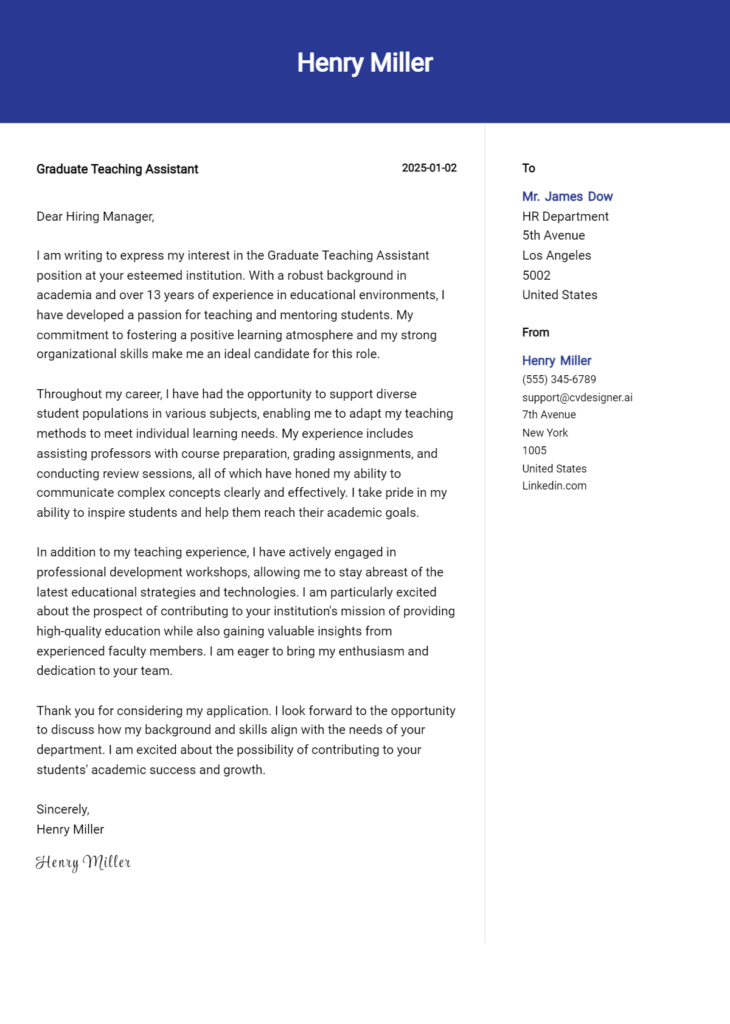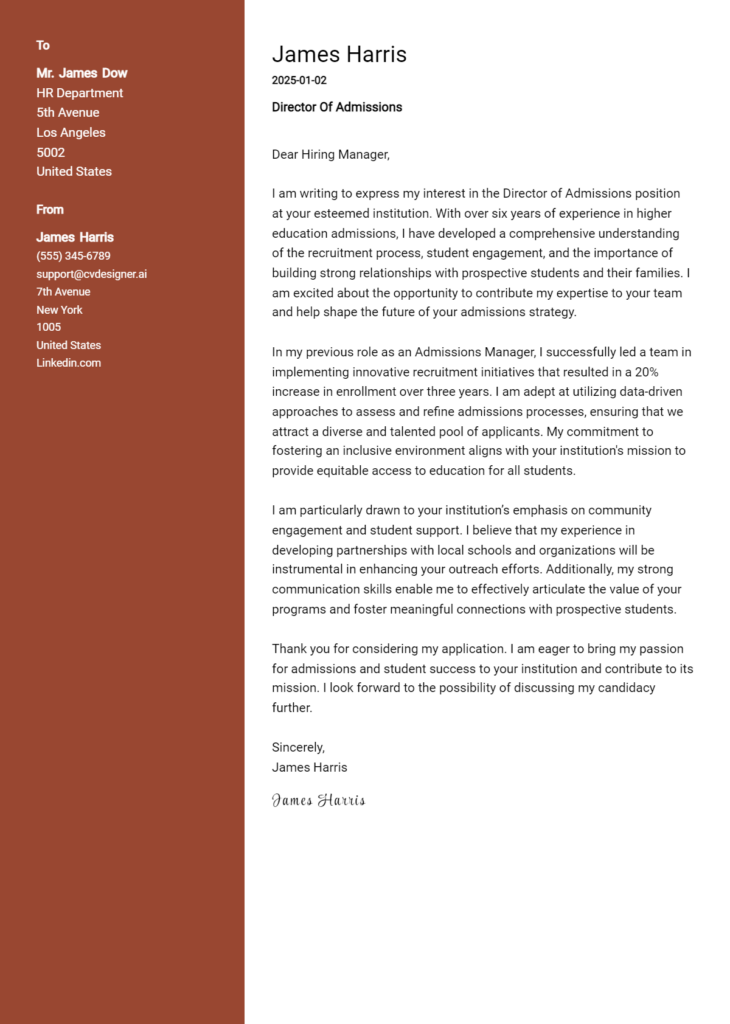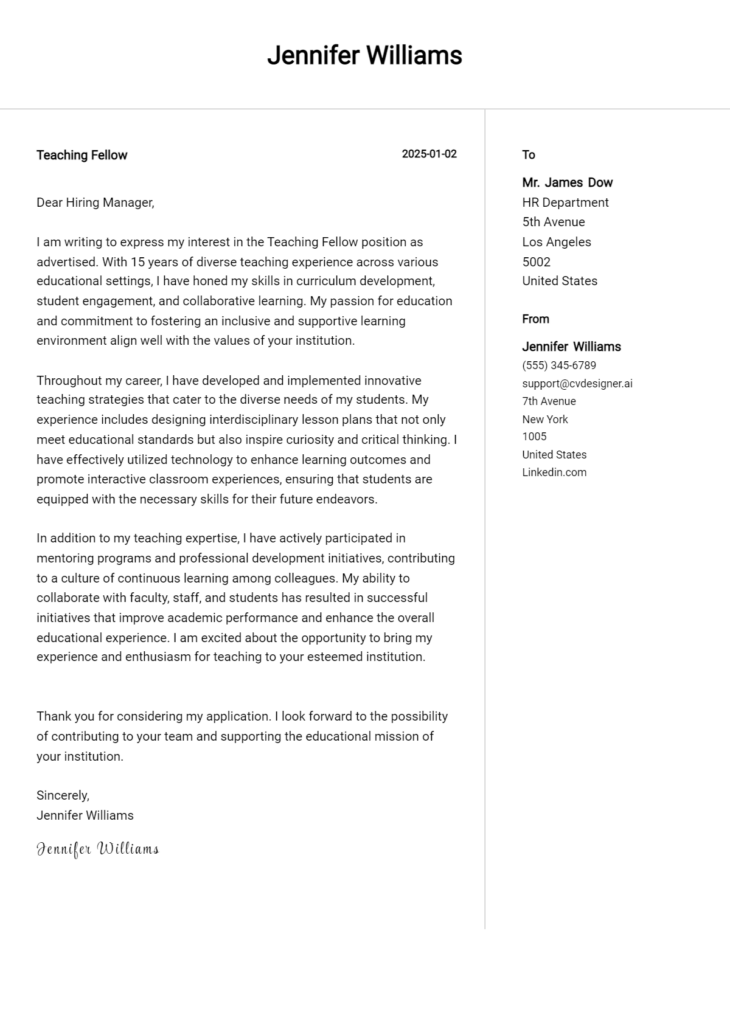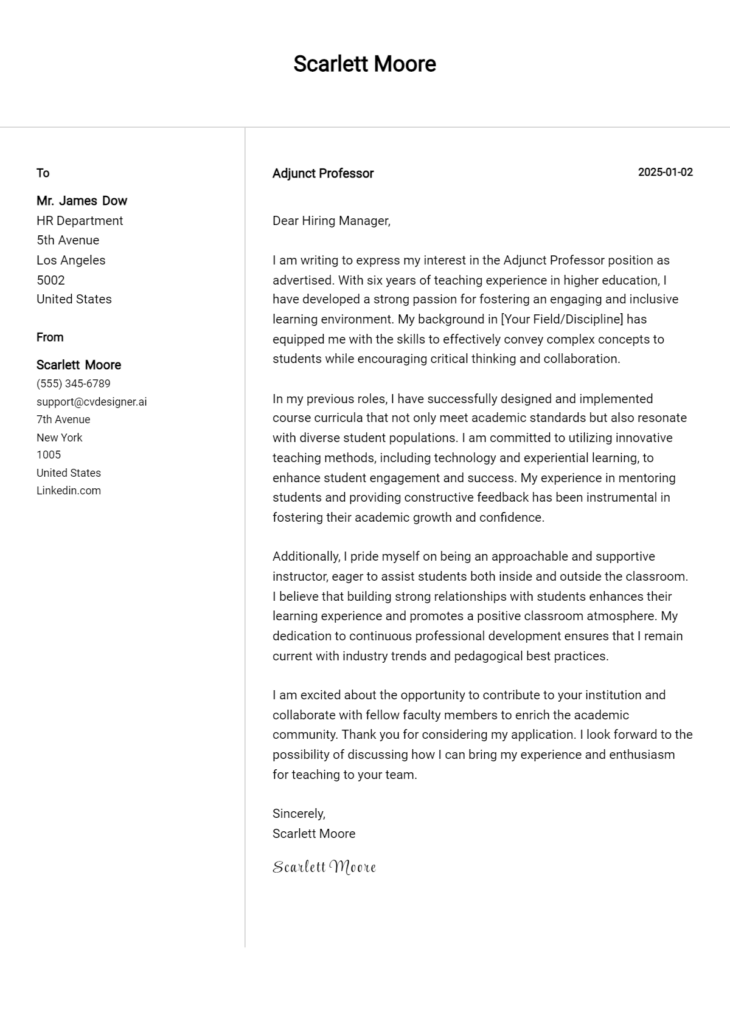College Professor Cover Letter Examples
Explore additional College Professor cover letter samples and guides and see what works for your level of experience or role.
How to Format a College Professor Cover Letter?
Crafting a well-structured cover letter is essential for aspiring college professors, as it serves as an introduction to your teaching philosophy, research interests, and professional achievements. The way you format your cover letter not only reflects your academic rigor and professionalism but also demonstrates your ability to communicate effectively—an important skill for any educator. A meticulously formatted cover letter captures the attention of hiring committees and showcases your dedication to the academic field.
In this guide, we will outline how to structure your cover letter, offering insights and examples tailored for college professors to help you create a persuasive document.
We'll focus on the essential components of a professional cover letter, including:
- Cover Letter Header
- Cover Letter Greeting
- Cover Letter Introduction
- Cover Letter Body
- Cover Letter Closing
Each section is critical in emphasizing your qualifications and educational commitment. Let’s delve into each part and explore how to make your college professor cover letter stand out.
Importance of the Cover Letter Header for a College Professor
The cover letter header is a crucial component of a college professor's application, as it sets the tone for the entire document and conveys professionalism. A well-structured header provides essential information at a glance, including the applicant's contact details, the date of submission, and the recipient's information. This clarity not only reflects attention to detail but also ensures that the letter is easily identifiable and accessible to the hiring committee. A strong header can make a positive first impression, while a weak or poorly formatted header can detract from the overall professionalism of the application.
Strong Example
Dr. Jane Smith 123 Academic Lane University City, ST 12345 janesmith@email.com (123) 456-7890 October 1, 2023 Dr. John Doe Department Chair College of Arts and Sciences XYZ University 456 University Ave College Town, ST 67890
Weak Example
Jane Smith 123 Academic Lane University City, ST 10/1/23 To Whom It May Concern
The Importance of the Cover Letter Greeting
The greeting of your cover letter is the first impression you make on the hiring committee, setting the tone for the entire document. A well-crafted greeting not only demonstrates your professionalism but also shows your effort to personalize the application by addressing the hiring manager directly. This small yet significant detail can make your letter stand out in a pile of applications. To avoid sounding generic, it’s wise to research and find out the name of the person responsible for the hiring process. If you cannot find the name, ensure your greeting remains respectful and formal.
Strong Greeting Example
Dear Dr. Smith,
Weak Greeting Example
To Whom It May Concern,
The Importance of a Well-Crafted Cover Letter Introduction for a College Professor
A well-crafted cover letter introduction is crucial for a college professor seeking a new position. This opening paragraph serves as the first impression for hiring managers, making it essential to capture their attention immediately. An effective introduction should not only express genuine interest in the role but also highlight key skills or accomplishments that align with the institution’s values and objectives. A compelling introduction can set the tone for the entire application and differentiate a candidate from the competition. Below are examples of strong and weak cover letter introductions to illustrate the impact of this critical component.
Strong Example
Dear Hiring Committee, I am excited to apply for the position of Assistant Professor of Psychology at XYZ University, as advertised on your website. With over ten years of experience in higher education and a proven track record of engaging students through innovative teaching methods, I am eager to contribute to your department's commitment to academic excellence. My recent research on cognitive behavioral therapy has been published in several esteemed journals, and I am passionate about mentoring students in their academic and professional pursuits.
Weak Example
To Whom It May Concern, I am writing to apply for the college professor position. I have some experience in teaching and think I could do a decent job. I’ve taught a few classes and have some research that I’ve done, but I’m not sure if it’s relevant to your school.
Purpose of the Cover Letter Body for a College Professor
The body of a cover letter for a college professor serves as a critical platform for candidates to articulate their qualifications, showcase their teaching philosophy, and highlight relevant experiences that align with the institution's values and needs. This section allows candidates to detail specific projects, research initiatives, or accomplishments that demonstrate their expertise and passion for education. By effectively communicating their contributions to academic communities, such as curriculum development, student mentorship, or groundbreaking research, candidates can illustrate their potential value to the hiring institution, making a compelling case for their candidacy.
Strong Example
Dear Search Committee, I am excited to apply for the Assistant Professor position in the Department of Biology at XYZ University. My recent project on the impact of climate change on local ecosystems not only resulted in a publication in the Journal of Environmental Science but also engaged over 50 undergraduate students in hands-on research. This experience reinforced my commitment to experiential learning and mentorship, which I believe are crucial in shaping the next generation of scientists. I am eager to bring my research expertise and collaborative spirit to your esteemed faculty, fostering an environment where students thrive and contribute to meaningful scientific discussions.
Weak Example
Dear Hiring Manager, I have been a professor for a long time and have taught many classes. I believe I am a good fit for the position. I have done some research, and it was okay. I think I would be a good addition to your university because I like teaching students. Thank you for considering my application.
Importance of the Cover Letter Closing for a College Professor
The closing paragraph of a cover letter is crucial for leaving a lasting impression on the hiring committee. It serves as a final opportunity to summarize your qualifications, reiterate your enthusiasm for the position, and encourage the reader to take the next step—such as reviewing your resume or scheduling an interview. A strong closing paragraph can enhance your application by reinforcing your fit for the role, while a weak closing may leave the committee uncertain about your interest or qualifications.
Strong Example
Thank you for considering my application for the College Professor position in the English Department at XYZ University. I am excited about the opportunity to contribute my expertise in contemporary literature and my passion for student engagement to your esteemed faculty. I believe my innovative teaching methods and commitment to research align perfectly with your department's goals. I look forward to the possibility of discussing my application further and am eager to provide additional insights into my qualifications during an interview. I have attached my resume for your review and hope to hear from you soon.
Weak Example
I hope you like my application for the College Professor job. I think I might be a good fit, but I’m not sure. Anyway, please look at my resume if you want. Thanks for your time.
Crafting an effective cover letter for a college professor position is crucial in making a strong first impression. A well-written cover letter not only highlights your academic credentials but also showcases your technical skills, problem-solving abilities, knowledge of the Software Development Life Cycle (SDLC), teamwork experiences, and a genuine passion for continuous learning. Below are some tips that will help you articulate these attributes effectively.
Tips for Writing a Cover Letter for a College Professor Position
Highlight Your Technical Skills
Clearly demonstrate your technical skills relevant to the position. Whether it's proficiency in specific programming languages, familiarity with educational technology tools, or experience with online teaching platforms, make sure to mention these skills. Use concrete examples from your work or research to illustrate how your technical expertise can contribute to the academic environment.Emphasize Problem-Solving Abilities
Academia often requires innovative solutions to complex problems. Share examples of challenges you have faced in your teaching or research and describe the strategies you employed to overcome them. This not only shows your analytical thinking but also reflects your resourcefulness in an academic setting.Showcase Your Knowledge of SDLC
If relevant to your field, discuss your understanding of the Software Development Life Cycle and how it applies to your projects or teaching. Explain how your knowledge can enhance course content or research initiatives, positioning you as a candidate who can bridge theory and practice effectively.Illustrate Teamwork Experiences
Collaboration is key in academia. Share instances where you successfully worked within a team, whether in research projects, curriculum development, or interdisciplinary initiatives. Highlight your ability to communicate effectively and your willingness to mentor or support colleagues, showcasing your commitment to fostering a collaborative environment.Express a Passion for Continuous Learning
Convey your enthusiasm for professional development and lifelong learning. Mention any workshops, conferences, or online courses you have attended to improve your skills. This not only reflects your commitment to personal growth but also indicates your readiness to adapt to new teaching methods and technologies, which is essential in a rapidly evolving educational landscape.
For additional help in crafting your cover letter, consider exploring cover letter templates or using a cover letter builder to streamline the process and ensure a professional presentation.
Common Mistakes to Avoid in a College Professor Cover Letter
Crafting a compelling cover letter is essential for a successful application as a college professor, as it provides a first impression of your qualifications and teaching philosophy. Avoiding common pitfalls can significantly improve your chances of standing out. Here are five mistakes to watch out for:
Generic Content: Many applicants use a one-size-fits-all approach. Tailor your letter to the specific institution and position. Research the college's mission and values and align your experiences with them.
Ignoring Formatting Guidelines: Neglecting proper formatting can make your letter look unprofessional. Follow a clear and organized cover letter format to enhance readability.
Lack of Specific Examples: Failing to provide concrete examples of your teaching experience and achievements can weaken your case. Use specific anecdotes to demonstrate your effectiveness as an educator.
Overly Long Letters: Lengthy cover letters can lose the reader's interest. Aim for a concise letter that highlights your most relevant qualifications in a few well-crafted paragraphs.
Spelling and Grammar Errors: Typos and grammatical mistakes can undermine your professionalism. Always proofread your letter multiple times or have someone else review it before submission.
Focusing Solely on Research: While research is important, a successful cover letter should also emphasize your teaching philosophy and engagement with students. Balance both aspects to present a well-rounded profile.
Neglecting a Call to Action: Failing to express your enthusiasm for an interview or a follow-up can make your letter seem passive. End with a strong statement about your eagerness to discuss your application further.
For additional guidance, consider reviewing cover letter examples to inspire your writing and ensure you avoid these common mistakes.
Cover Letter FAQs for College Professor
What should I include in my cover letter as a college professor?
Your cover letter should highlight your academic qualifications, teaching philosophy, research interests, and relevant experience. Start with a strong opening that specifies the position you’re applying for. Discuss your educational background, emphasizing degrees and any specializations. Include your teaching experience, detailing courses taught, pedagogical strategies employed, and student feedback if available. Discuss your research contributions and any publications or projects, demonstrating your active engagement in your field. Finally, express your enthusiasm for the institution and how your values align with its mission. Tailoring your letter to the specific department and institution shows genuine interest and can set you apart.
How long should my cover letter be?
A cover letter for a college professor position should ideally be one page long, typically around 300-500 words. This length allows you to provide enough detail about your qualifications without overwhelming the reader. Focus on being concise and relevant; each paragraph should serve a purpose. Start with an introduction that captures interest, followed by sections detailing your academic background, teaching experience, and research contributions. Conclude with a strong closing that reiterates your enthusiasm for the role and invites further discussion. Remember, hiring committees often review numerous applications, and a well-structured, succinct cover letter is more likely to leave a positive impression.
How can I demonstrate my teaching philosophy in my cover letter?
To effectively demonstrate your teaching philosophy, include a dedicated section in your cover letter that articulates your beliefs about education and learning. Use specific examples to illustrate how these beliefs shape your teaching practices. For instance, discuss your approach to student engagement, assessment methods, or how you foster an inclusive classroom environment. Mention any innovative teaching techniques you’ve employed or how you've adapted your teaching style to accommodate diverse learning needs. Additionally, relate your philosophy to the institution’s values or teaching mission, showing that you would fit well within their academic community. This not only personalizes your cover letter but also provides insight into your teaching mindset.
Should I address my cover letter to a specific person?
Yes, addressing your cover letter to a specific person is highly recommended when applying for a college professor position. This demonstrates your effort and attention to detail, making a positive impression on the hiring committee. If the job listing includes the name of the hiring chair or search committee, use it. If not, you can often find this information on the department’s website or by contacting the department directly. Using a specific name, such as “Dr. Jane Smith,” adds a personal touch and shows your genuine interest in the position. Avoid generic salutations like “To Whom It May Concern,” as they can suggest a lack of initiative in your application.
Build your Cover Letter in minutes
Use an AI-powered cover letter builder and have your letter done in 5 minutes. Just select your template and our software will guide you through the process.

